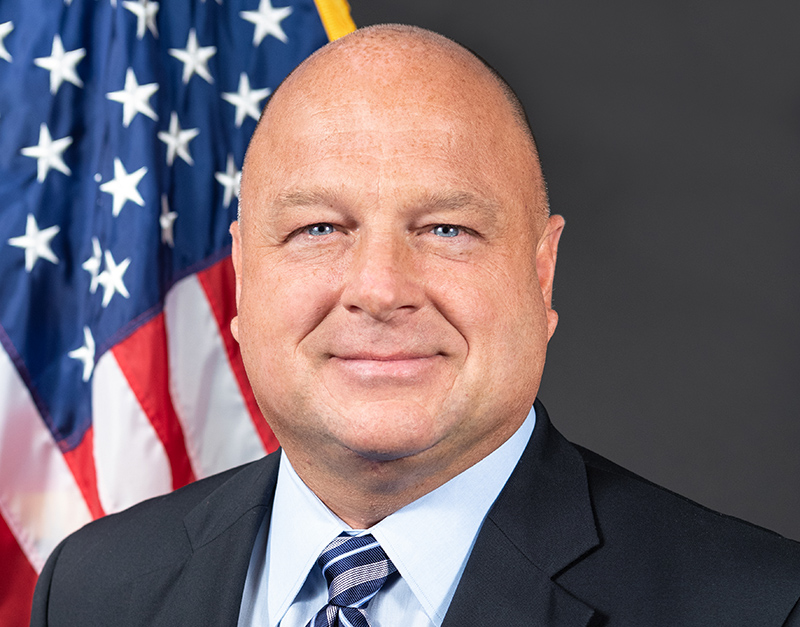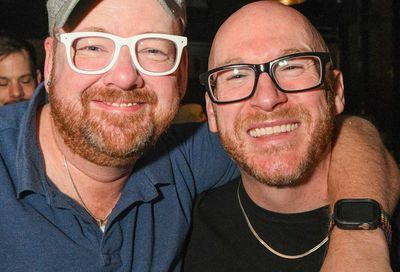Presidential historian Tim Naftali on Trump, Biden, and what’s next for America
Scholar and CNN contributor discusses how Donald Trump crashed his party, and what Joe Biden can do to reunite our nation.

“We don’t think of our history in terms of eras of New York governors, or governors of Oregon, or of Texas,” says Timothy Naftali. “We think of it in terms of the president. That’s the way it works in our history.”
Naftali is discussing how Joseph R. Biden, whose term as the 46th President of the United States starts at noon on Wednesday, January 21, can help bridge the vast divide between Red and Blue states during the pandemic.
“As long as credit can be shared, share the credit,” is Naftali’s advice. “There’s a lot of praise to go around [when it comes to ending the pandemic]. And if it’s clear that everybody is going to get praised, even governors who were not helpful in the [wear a] mask period, then you take the stinger out of the argument — an argument that some will still use — that it’s a liberal federal government trying to impose its worldview. When one American benefits, every American benefits.”
A familiar, frequent commentator on CNN, Naftali is as eager as anyone for politics to veer miles away from Trumpism — in which President Donald J. Trump and his enabling flock of Congressional lackeys created a steady drumbeat of lies that inevitably led to an appalling, violent siege on the U.S. Capitol on January 6 in the name of “patriotism” — and return to a more normalized state of governance. Much needs to occur for that to happen, and Naftali lays it out systematically and logically over the course of an engaging, insightful conversation on Monday, January 13, just two days before Trump became the first sitting president in history to be twice impeached by Congress.
“What I’m not sure of at the moment,” says the 58-year-old Canadian-American, “is how quickly we are going to get through the sickness in our polity. I’m framing it as deradicalization, coming to terms with how some Republican influencers started yelling fire in a theater, but the answer is not from a university instructor Zooming their thoughts. It’s going to come from influencers and respected people on the ground taking their friends, sitting down over beers, and saying, ‘What the hell just happened?’ And then getting back to first principles — their family, their jobs, their hobbies — to break this cycle of radicalization.
“That is really the way out for us,” he asserts. “It’s not going to be getting people to embrace Democrats. Maybe they’ll sympathize with some of the ideas of Democrats. But the challenge is that we have one party whose leadership is clearly devoted to the U.S. Constitution, and another party whose leadership is sending, at best, mixed signals about our constitutional order. That is a situation that is full of dangers for our republic.”
Naftali, who from 2007 to 2011 helmed the Richard Nixon Presidential Library and Museum in L.A. and is responsible for curating its honest and unflinching exhibition on Watergate (“My job was not to run a shrine”), currently serves as a Clinical Associate Professor of Public Service at NYU/Wagner University. He’s long held a fascination for history, specifically the presidency and counter-intelligence, and has authored several notable books on the subjects.
Easygoing, lively, and forthright, he calls himself a political nerd before quickly adjusting his terminology, as if tucking in a shirt so it fits better. “I’m wonky more than nerdy. I’m wonky. I might care about your policy preferences,” he says of politicians, “but I want to feel comfortable with your judgment.”
Naftali’s analysis of the Republican politicians who enabled Trump to ride roughshod over their party for the last four years is fairly straightforward. “Ambition,” he says, “without any ethical structure. Situational ethics taking over. ‘This is what I need to do to win, and the public needs me to win because I understand them’ drove some of this. Some of it is driven by ideological nonsense, perversions of conservatism — a lot of it on the part of people like Senators [Ted] Cruz and [Josh] Hawley. I mention them because they’re the most articulative of the president’s supporters in the attempted constitutional coup. They seem driven by ambition.”
Naftali draws comparisons between Trump — and his enablers — and the McCarthy era.
“I’ve spent some time studying the phenomenon of McCarthyism and the number of otherwise sane members of Congress who, if not furthered McCarthy’s demagogic nonsense, enabled it by staying silent when they could have contained it…. The difference in our period is that Trump was the McCarthy in the White House, instead of being in the Senate. But you saw the same weakness, the same cowardice on the part of elected officials.”
Their collective unwillingness to challenge Trump, or temper his worst excesses, culminated in the terrifying assault of the Capitol on January 6th. “That didn’t happen overnight. The pot’s been boiling for a while, but Trump kept putting up the heat. My question to those that recognize that what happened was wrong is ‘Why did you let it get so bad?’… Part of it is a fear of constituents — not a fear of all of them, but a fear of the vocal ones.
“In the pre-digital era, people were afraid of what they saw in the mail,” he continues. “Congressional mail mattered a lot, even though a lot of it was whipped up by lobbies. It didn’t represent the individual conclusions of Americans, but were whipped up by groups that would send these formulaic letters to Congress. But Congress would often, in an attempt to figure out what their most active constituents wanted, follow the most extreme of their most active citizens. It’s a historical challenge for Congress.
“In the Trump period, I think this was accentuated by his use of Twitter, and the fear on the part of Republicans of being primaried. Well, frankly, as Colin Powell said the other day, ‘You can do something else.’ Most of these people don’t like government anyway, they talk about how successful they were in the private sector. So why didn’t they just go back to the private sector? If you felt you were being forced to say things you didn’t believe, just go back to being a business person and make money. Why did you decide to stay in office and convey lies, when it would’ve been so easy to say, ‘Look, I’m done now.’
“Some did,” he concedes. “Jeff Flake did. And a number of other Republicans did not run for reelection. I suspect many of them did it for these very reasons. But for the ones who decided to stay, at a certain point you have to be responsible for the climate you’ve created, and this is the moment. So if there’s going to be a moment for Republicans to separate themselves — I mean, it’s very late, frankly — to separate themselves from the anti-constitutional mob, and that thinking behind that of Donald Trump, that moment is now.”
METRO WEEKLY: I’ve been watching you on CNN for years. I looked you up on Wikipedia and, under your personal section, it simply reads, “Naftali is gay.” I thought to myself, “That’ll be an interview one day.” Given that we’re about to head into the inauguration of our 46th president, and everything that’s happening in this country, I thought this issue would be the perfect opportunity to get your perspective. But let’s start on a personal note. You live in New York now, but you’ve lived in D.C.
TIMOTHY NAFTALI: One of the greatest schools I went to was in Washington — I was in graduate school at Johns Hopkins SAIS from 1985 to 1987. And then I lived in Washington again around 2005, 2006. Then I went to work at the Nixon Library, but I would come back to Washington once a month because I had staff at College Park. So I would visit friends and go out. I have a lot of affection for the District of Columbia.
MW: What is it about D.C. that appeals to you?
NAFTALI: As a kid from Canada, the District was a symbol of the United States for me. I loved its neoclassical buildings. I loved the monuments. It was a place for a kid who liked history. It was North America’s Rome and its Colosseum, until January 6th, hadn’t been trashed. Washington, D.C. is important to me as well because it’s where I got to live as an out gay man for the first time. So I have a very passionate attachment to the District.
MW: How old were you when you came out?
NAFTALI: I was 41.
MW: Why do you think it took you until then to come out?
NAFTALI: That’s a good and fair question. Everybody’s coming out story is very personal. It’s unique to them. In my case, it was fear of AIDS. I knew that I was at least bisexual when I was in college — I graduated from college in 1983. I had gay friends, and they talked to me about New York and told me about people getting sick. They weren’t sure what it was. People thought it was hepatitis. And so part of it is that I was scared. I’m not proud of that. But that is my story. I just was afraid. But, I think, like a lot of the LGBTQ community, I was dealing with social expectations of my own. Did I want to take on this mountain of disappointment and bias and prejudice and meanness?
So I wrestled with it, and then I came out. I will always be grateful to my girlfriend at the time — I’ll just leave it at that. We all know that our coming out story involves other people. In my case, I benefited from people who loved me and made it easier in the end, but it took a while.
MW: People who weren’t alive in the ’80s don’t have a grasp of how paralyzing, how terrifying the AIDS epidemic truly was. In some respects, it’s not unlike what we’re going through now with COVID.
NAFTALI: COVID is a different kind of virus but, like AIDS, it was met with denial. It was also met by a federal government — at least an executive branch — that took a long time to encourage a sane public health strategy to deal with the crisis. And so a lot of people got sick who didn’t have to get sick.
No one deserves to get sick, but a lot of people got sick through ignorance. And that, to me, is unconscionable. I don’t mean willful ignorance. I mean the fact that the people who should have been sharing information about how to stay healthy were not. In fact, they were spreading lies about the nature of the challenge.
MW: We’d be in a much different place today if they simply had been honest about COVID from the start.
NAFTALI: Oh, absolutely. When you think about the struggle in the Reagan Administration to admit the value of condom wearing, and then you think about the struggle to admit the significance and value of wearing a mask? Politics can kill in a public health crisis.
MW: We’re not seeing the rollout of the vaccine go smoothly so far. Do you think the Biden administration will get America back on track with regard to recovering from the pandemic?
NAFTALI: I’m not very good at predicting. I expect that — and we’re seeing it already — the weak rollout of the vaccine is going to improve, in part because you’ll have a federal government that is helping. The Trump Administration was pretty good at directing resources at companies — throwing money at companies — but then it washed its hands, literally, of any responsibility in the last mile of getting the vaccines into arms.
We already know that the Biden Administration will focus on this. They don’t have to do very much to improve the rollout, and the rollout will accelerate our rush to a more normal period. As we vaccinate more people, we will see an economic recovery because we’ll be able to engage in more activities that employ people.
I just don’t know how long it’s going to take, this return to a largely pre-COVID world. I mean, we’ll never fully get back to the pre-COVID world. COVID will be amongst us for a while, particularly if anti-vaxxers continue the kind of propaganda they’re engaging in now — and I don’t know why they would stop, unfortunately. But I expect recovery over the course of 2021.
There’s another question there, sort of embedded, if I may, about the health of our political systems. What I’m watching right now, as many are, is to see the extent to which January 6th is a litmus test. January 6th is going to shift some of the rhetoric on the right in this country. It seems to me that if a large number of Republican influencers don’t denounce the “Stop the Steal” campaign, don’t denounce January 6th fully — it was violence in support of a president’s false claims — that we’re going to face unrest and, I fear, a wave of domestic terrorism that will be worse than what we saw in the 1990s and in the Obama years.
MW: Republicans are mostly calling for moving past January 6th, calling for healing and unity.
NAFTALI: I’ve been struck by Republicans who have been saying to the Democrats, “Don’t do this, don’t do that, we need to be healing.” Well, it’s not up to the Democrats. I’m not sure what Democrats could do to heal. What do you want them to do? Say it’s okay?
The only way for us to heal, in my estimation, is for more Republicans to stand up and say this was wrong and Donald Trump is a false idol. And he drove you to undertake a violent anti-constitutional act, and you should be full of shame and the criminals should go to jail. But the problem is not just those who took flagpoles to break down the doors of the Capitol. The fact that others see them as patriots is the problem.
So we have two challenges after noon on January 20th, 2021. One is to heal our bodies, our public health, and with it, our economy. The other is to heal our polity, our American political community. One can help the other. There are more economic opportunities, the extent to which people are driven by economics, that should improve the health of our political community, but that’s not enough. Because as we’ve noted in elections, people are not necessarily ultimately driven by economic considerations. There are spiritual, religious, ideological considerations that move people to vote one way or the other. And those are not going to be resolved by the end of the pandemic and its associated economic recession.
MW: What can President Biden and Vice President Harris do to help us along?
NAFTALI: What President Biden and Vice President Harris can do is set a better tone and not encourage the radicalization of folks. But deradicalizing people already radicalized will take the work of pastors and ministers, of local officials, of respected individuals in communities across this country. And that work is largely going to have to happen on the center-right and the right for us to heal as a nation. There should be no time wasted, just as there should be no time wasted in getting vaccines into arms. There should be no time wasted in beginning the process of deradicalizing and persuading millions of Americans to embrace our Constitution and the realities of the election that we just had.
MW: When Trump was elected in 2016, did you foresee things getting this bad?
NAFTALI: I was worried, and I wrote about it in 2016, right after the elections. I didn’t talk about an insurrection, but I worried about the consequences of an abusive president. I wrote about how elements of the White House tried to contain Nixon. Obviously, it was an incomplete and flawed effort on the part of the Nixon leadership team, because they shared some of his prejudices, but they did stop — and we don’t even know all the things they stopped, because they didn’t write it down — but they did stop him from acting out his worst fantasies. And I speculated about how a system like that would need to be set up for someone like Trump, based on his behavior in the campaign.
I worried about violence, yes, on January 6th. What I didn’t predict — and again, it’s not really what you ask historians to do — was the willful lack of preparation by Capitol security. I’ve seen how Washington responded to 9/11 and the kinds of new protocols that were put in place to protect our political spaces. I saw on television the overreaction to the Black Lives Matter marches in Washington. So it was incomprehensible to me when I saw [the response to] 8,000 people overrunning the Capitol.
I’m very hopeful that we will have a joint investigation of January 6th in Congress by both Republicans and Democrats. Not simply about the breakdown of security, but to learn who was instigating this besides Trump? Who paid for these people to come to Washington? What were they promised? What were they messaging each other? Were there leaders? We’ve got a lot of pranksters and also ransackers who were stupid enough to post videos. But are there people who were in the darkness, who were planning this? Who are these people who brought Molotov Cocktails and pipe bombs? What did they think they were doing? Did somebody orchestrate that? Were they just lone terrorists?
There is a whole backstory to January 6th that we, as a people, need to explore. And I think it will help us in the fight against whatever domestic terrorism challenge we face once President Biden is elected, because this may give us insight into the move, into people who will be bitter-enders, who will not see January 6th as the end of the struggle but as the most dramatic moment in a continuing struggle.
MW: In your opinion, has Donald Trump damaged the office of the presidency beyond repair?
NAFTALI: The office of the presidency is a reflection of what most Americans want it to be. And so, in November of 2020, it was a referendum on Trump’s norm-busting. This was not a close election, as it turned out. Most Americans said “We don’t want the behavioral traits associated with this presidency to continue as a permanent part of the presidency.” And so I anticipate that many of them will be washed away. It’ll be a bad memory.
We have had presidents who have acted out in the presidency, who have used it as a citadel of hate. Andrew Jackson did that. Andrew Johnson did that. Andrew Johnson spread hate, tried to undermine the hard-fought political liberties of formerly enslaved people. We’ve had people desecrate the office and then be replaced by those who take a different approach. In the end, history has rewarded — or at least the American people rewarded through their living memory — those presidents who have come and reversed the damage.
When I was asked this during the first years of the Trump administration, I always said — and I meant it — it depends on what happens in 2020. If he gets reelected, yes, he will have perverted the office, and future Trumpsters will look at that as a rallying cry. He will encourage a new generation to do the same thing, because it will have worked. Because in our system, if you get reelected, it validates your behavior in the first term. That’s why reelection is the most important moment.
The public makes mistakes. And there were a concatenation of circumstances that produced outcomes, which to the extent there isn’t one America. We’re a lovely, diverse country that changes. And the elements of that country change its mind, too. Not everybody’s thinking about politics all the time.
My point is that over time reputations gel, and those reputations are not just interesting to historians, but to politicians. Look at the previous presidents they talk about. Ronald Reagan. Franklin Roosevelt. John F. Kennedy. They don’t talk about failed presidents or people perceived as failed presidents. I mean, we’ve not yet had somebody run promising us a return to Jimmy Carter, for example — though he’s had an excellent post-presidency, and his presidency is being reexamined.
My point simply is that some of Donald Trump’s reputational power over the future of the Republic was severely diminished by his loss. I am hopeful that January 6th will further undermine his reputational power — but that’s to be seen and that depends on what Republican influencers say and how Republicans run in 2022.
What happens to Ted Cruz and Josh Hawley, for example? Not in terms of whether they lose their jobs — that’s up to the states of Texas and Missouri — but what is their power as influencers? Do they pay a price for creating a climate that enabled an angry mob? They will say that they did not ask the mob to attack the Capitol, but there can be no doubt that they enabled the anger in that mob by transmitting falsehoods, that they knowingly transmitted falsehoods. They were stoking up people with false hope. They knew they couldn’t deliver on their promise, yet they did it anyway.
And when you do that, unless you’re an idiot — and neither one of them is an idiot — you recognize that you are marching people into a dead end. And when you march people into a dead end, they’re going to turn on someone. And that’s what happened. So right now, these are days of decision. We are watching the effect on reputation. And reputation in politics is a very powerful thing.
So to answer your question again: Donald Trump’s lasting effect on the presidency was averted by him not being reelected. But his effect on short-term and medium-term American politics is yet to be determined and is going to be decided by the American people, and most importantly by Republican and far-right influencers.
MW: Has social media made the job of presidential historians easier in terms of materials available for the record?
NAFTALI: Well, every technology that captures ideas and words from people in power, lawfully, helps us figure them out. One of the hardest challenges for a presidential historian is “presidential intent,” because in a normal White House there are many layers of advisers. I mean, obviously the president approves it, but we don’t know how he got there — or, some day, how she got there — and we don’t know how much the advisors massaged the effort.
Presidential tapes allow us to go right to the source and hear the process by which presidents make decisions. And, in the case of some presidents, how they actually learn on the job. And that’s very helpful. I think it’s a sign of good leadership when presidents change their minds in the face of facts. We’ve just had a president who resisted publicly ever changing his mind, and certainly never admitted error.
MW: Apart from that being Donald Trump’s lifelong M.O., why do you think that is?
NAFTALI: I think it was a sign of intellectual insecurity on his part, [and in never admitting error] his followers were encouraged. People are individuals and they make their own decisions — they’re not all sheep. But when you deeply admire somebody and that person basically tells you, “Don’t ever show weakness to the other side. Never change your mind. You know what’s right,” you are just being fed from the darkest side of human behavior. So I’m looking forward to the inauguration of a president and a vice president who can learn on the job. One of the things about our greatest presidents and vice presidents is that they have learned on the job.
I differ with many of the things that Ronald Reagan did, but I do teach about how his ideas about the Soviet Union evolved and how he was willing, at the end of his second term, to be a partner with a Soviet leader who had decided to end the Cold War. Their partnership was a powerful stimulus to the collapse of the Soviet system and of the Soviet empire in Eastern Europe. John Kennedy learned on the job about civil rights and took a moral stance which was harmful to him politically but was right, and really put the presidency squarely on the side of morality in the struggle for full African-American political rights.
MW: Obama and same-sex marriage.
NAFTALI: Yes. Obama and same-sex marriage. Franklin Roosevelt. When you talk about the New Deal, there were a number of New Deals. There’s certainly two major ones. And the first New Deal and the second New Deal both have the same objective, but they used fundamentally different approaches to get America out of the Great Depression. The second New Deal is far more interested in creating a safety net going forward after the country’s recovered from the depression. So Franklin Roosevelt learned on the job. George H. W. Bush’s decisions with regard to the budget, for example — he knew in advance that Reaganomics didn’t work, and he realized he had no choice but to break his promise to Republican primary voters and Republican voters in the general election.
Our greatest presidents have done what was necessary in their judgment, despite their political promises. We’ve got a few days to go, and it’s been a strain, but we’ve managed to survive a presidency of someone who had refused not only to act on new data, but refused to absorb that new data, and then stirred his population by rejoicing in the fact that he didn’t respond to data by saying, “I’ve renounced this information. These people are trying to change my mind. This is the swamp acting this way. On your behalf I’m not going to absorb the information that the federal government spends billions of dollars collecting. No, I am going to continue in my ignorance on your behalf, because that’s what you expect of me.” We’re moving away from that back to a more normal [presidency]. And that’s not a partisan comment.
Trumpism is the abnormality in the modern era in the White House. Trumpism certainly isn’t the Republicanism of any of the Republican presidents in the modern era before him. So, we’re going to return to a presidency where people read reports, people act on data, people don’t try to manipulate the data, and then do their very best based on a philosophy that they have already shared with the American public. Remember, the philosophy doesn’t change, but the policy might, depending on the data. That’s the more normal approach. That’s the approach that most democratic governments throughout the world take. And American exceptionalism should not be that we are led by someone who’s ignorant to information, hates information, and attacks those who provide him with information.
MW: Which brings us to Biden and the hope he holds out for a return to normalcy while leading us out of the pandemic.
NAFTALI: I’m generally an optimist. I believe that Biden and Harris will accrue gratitude and good feelings as we exit the pandemic. They’re the ones in Washington. They’re the ones who are going to be spreading helpful, positive, useful information. They’re the ones who are going to unmuzzle the great Dr. Fauci.
MW: We’re going to have an administration that actually functions.
NAFTALI: And I think people will see that. But again, one of the challenges is how to break through a huge bubble that encompasses millions of people who have a set of alternative facts.
It’s just the power of persuasion. We have a federal system. I don’t think it’s going to help Washington if recalcitrant governors use some tired rhetoric about Washington trying to take our liberty away from us. I think the challenge will be to work with governors to at least get them on the same page. And I suspect that you will find that many governors would love some more money to be able to improve distribution of the vaccine, and those governors are going to be from Red states and Blue states alike. What’s always important with good government is that you look for mutual interest and you work on them, and you avoid immediate mandates unless there’s overwhelming public support for them.
One of the things that Trump did — actually he didn’t do it, Jared Kushner did it, because Trump basically was AWOL — was that he allowed for a competition among the states for PPE. We shouldn’t have a competition among the states for anything with regard to the vaccine right now or with regard to any element of COVID. So that’s where the federal government can be helpful.
MW: We’ve watched Trump decimate LGBTQ rights after all the good Barack Obama did. How important is it that Biden enact pro-LGBTQ policy changes in his first 100 days?
NAFTALI: Well, I remember Biden’s role in nudging President Obama to embrace same-sex marriage, so I have no concerns that he’s on the right side of those issues. I think that the President of the United States has to make clear that transgender Americans are not going to be subject to discrimination. And you’ll have to ask a civil rights lawyer as to what fixes are needed for that.
We have been through such a painful, divisive period that a lot of Americans need reassurance that the federal government is on their side. And President Biden and Vice President Harris should send those signals. Now, what legislative, or policy, or executive orders are required? I’m not as knowledgeable about that, but whatever roadblocks Trump put up, any executive orders, should be removed. That’s the healing that Democrats can do. And that’s the other kind of healing. There’s a lot of healing that’s needed, but that’s the healing that the incoming administration is best suited to doing.
MW: We have a woman taking on the mantle of vice president for the first time in our history — and a woman of color, no less. I know you can’t predict the future, but how likely do you think it is that Kamala Harris is next in line for the presidency?
NAFTALI: Let me put it this way: Vice presidents — it’s a sort of curiosity of our system — historically have not been that successful [being elected] president. They make good presidents if they’re elected, but it hasn’t happened that often. Even though the public is trained to view them as the heir apparent, the party doesn’t necessarily view them as the heir apparent. And sometimes the public is tired of the philosophy and the approach of a president and they don’t want a third term. On the one hand, as vice president, Kamala Harris is the number two in the Democratic Party — maybe Nancy Pelosi would have some qualms about that — but she is certainly the heir apparent for a future presidential run.
But whether she actually is embraced by the party — you have to be embraced by the party before you’re embraced by the people — will depend on her performance as vice president. It will depend on her relationship with the president and whether he wants to designate her as his heir apparent. None of this is foreordained. So we’ll be watching. We’ll be watching how they compliment each other.
Watch the messages of the vice president, because she won’t have a separate messaging approach. Her team will be doing this in coordination with the White House, and we’ll watch. It’ll be very interesting.
Every president assigns jobs to his vice president, so what jobs will she get? Lyndon Johnson got the Space Program. Dick Cheney, well, he got to study and do something about the proliferation of weapons of mass destruction. We need not discuss where that led us. Al Gore was actually trying to make bureaucracy more efficient by sort of reinventing government. He also worked a lot on the environment. And Mike Pence had an opportunity to be one of the most consequential vice presidents in history because he was given the most important brief in early 2020 from Trump — to lead the COVID Task Force. And, of course, he messed up completely, but he was handed a really substantive portfolio.
So what portfolio will Vice President Harris get? I don’t know, but that will help shape her image in the public mind, and, as we know, she was not a successful presidential candidate. She wasn’t even a contender, unlike Pete Buttigieg, for example, who, in terms of presidential politics, came literally out of left field. Kamala Harris started with much more name recognition. So she has an opportunity, through good work, through good government, to build a base that didn’t exist in the primaries. We’ll see how things turn out. As a citizen, it’s important. As a presidential historian, it’s fascinating. This story, which has yet to be written, of her vice presidency is going to be fascinating to watch. The political outcome for her is not foreordained.
MW: It’s interesting you bring up Buttigieg because, as much as I like him, as much as I think he’s got the makings of presidential material, I don’t think I’ll see a gay man elected to the presidency in my lifetime.
NAFTALI: Randy, I hope that you’re planning on being around 30 more years. And I really wouldn’t say that about what we’re going to see. In 2000, I’m sure people said the same about having an African-American president. So I wish you a long life, and I just wouldn’t make such a conclusive statement about what kind of president we may or may not see.
We’ve had the positive version of President Obama, the first African-American president. And the negative version, Donald Trump. Who could have imagined Donald Trump becoming president? Our country deserves another few positive examples of reaching beyond imagination to choose a head of state.
Timothy Naftali is the author of several historical non-fiction books, including George H. W. Bush (2007), Blind Spot: The Secret History of American Counterterrorism (2005), and most recently Impeachment: An American History (with Jon Meacham, Peter Baker, and Jeffrey A. Engel, 2018). Order from your local bookstore or at www.amazon.com.
Support Metro Weekly’s Journalism
These are challenging times for news organizations. And yet it’s crucial we stay active and provide vital resources and information to both our local readers and the world. So won’t you please take a moment and consider supporting Metro Weekly with a membership? For as little as $5 a month, you can help ensure Metro Weekly magazine and MetroWeekly.com remain free, viable resources as we provide the best, most diverse, culturally-resonant LGBTQ coverage in both the D.C. region and around the world. Memberships come with exclusive perks and discounts, your own personal digital delivery of each week’s magazine (and an archive), access to our Member's Lounge when it launches this fall, and exclusive members-only items like Metro Weekly Membership Mugs and Tote Bags! Check out all our membership levels here and please join us today!




























You must be logged in to post a comment.